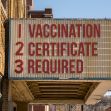Despite the fact that COVID-19 cases increased by more than 40% in the week between Christmas and New Year’s Eve, legal challenges to the Biden Administration’s “vaccine or test” mandates for large employers and health care workers are mounting. The Supreme Court has now agreed to hear oral arguments on January 7 to determine the legality of two such federal mandates that the White House has classified as “urgently needed protocols.”
Expediting oral argument has been called a “very unusual step,” because the Supreme Court normally waits for briefings before issuing emergency orders. During oral argument, the Court will review the statutory authority of both the Occupational Safety and Health Administration (OSHA) and the Centers for Medicare and Medicaid Services (CMS) to issue the regulations without explicit Congressional approval. These arguments will be considered before the court resumes its original schedule.
The OSHA regulations mandate that companies with over 100 employees either get vaccinated or take weekly tests. Regulations on healthcare workers who work in facilities that accept Medicare or Medicaid payments have similar requirements.
At oral argument, the Court will consider four consolidated cases in two sets of oral arguments. The first set is from the federal appeals court in the Sixth Circuit, which upheld the business mandate on December 31 by a 2-to-1 vote. The second set will review an Eleventh Circuit 2-to-1 decision that denied Florida’s motion for an injunction on the mandates, pending appeal.
In a brief filed by the Department of Justice, the Biden Administration asked the Supreme Court to leave the mandates intact. It responded to challenges that such mandates are an “unlawful exercise of government power.”
The Sixth Circuit ruling revoked a November injunction that had blocked OSHA from requiring over 180 million American workers to either get vaccinated or take weekly tests. The Sixth Circuit said that OSHA had “clear and recognized authority to regulate infectious diseases that are not unique to the workplace.”
“It is difficult to imagine what more OSHA could do or rely on to justify its finding that workers face a grave danger in the workplace,” the appellate court’s opinion said. “It is not appropriate to second-guess that agency determination considering the substantial evidence, including many peer-reviewed scientific studies, on which it relied.”
But at least a dozen challengers, representing large businesses and religious organizations, states with Republican governors, and an advocacy group led by former Vice President Mike Pence are doing plenty of second-guessing. For example, an organization called Advancing American Freedom, backed by Pence, filed an amicus brief that urged the Court to declare the mandate unconstitutional because it exceeds and is clearly distinguishable from “previous examples” of OSHA’s emergency authority, such as its regulation of asbestos.
Pence wrote, “America is about freedom and the ability to make the best decision for your family or business, and Joe Biden’s vaccine mandate must be stopped in its tracks in order to preserve freedom, protect American livelihoods and businesses, and to safeguard the constitution,” Pence told The Hill.
The controversial Sixth Circuit opinion reflects the Administration’s concern over the pandemic that has already killed more than 820,000 Americans and caused economic and personal havoc to a nation that is currently experiencing an alarming upsurge in cases caused by the much more transmissible Omicron variant.
The other regulation that will come before the Supreme Court originated with CMS. It requires all healthcare workers who are employed by agencies that participate in federally-funded programs such as Medicare to be fully vaccinated unless they are exempt for medical or religious reasons. In support of its rule, the Biden Administration reminded the Court that “healthcare workers have long been required to obtain inoculations for infectious diseases” and reminded the Justices that federal agencies have the authority to set conditions for programs receiving federal funds.
The Eleventh Circuit’s health care workers decision is also being opposed by groups such as Advancing American Freedom. But legal scholars such as Erwin Chemerinsky, Dean of UC Berkeley College of Law, argue that the Administration has the legal authority to issue the order. In a Los Angeles Times op-ed, he wrote “under well-established law, the Biden Administration’s vaccination mandates are clearly legal.” He said the Supreme Court’s decision should be “easy” because federal law clearly gives (these) agencies the authority to adopt such rules. In addition, he says that federal law “also requires judicial deference to agency decisions.”
The White House agrees and says it is “confident in the legal authority for both policies and [the Department of Justice] will vigorously defend both at the Supreme Court.”
As Omicron continues its rampage, employers and workers anxiously await a decision that many, including Chemerinsky, predict will strike the vaccine mandate. He writes, “…if I were a betting person, I’d wager against the Biden administration...” His op-ed explains that judges in lower courts were split along partisan lines, with those appointed by Democratic presidents voting to uphold regulations, and those appointed by Republicans voting to strike them, “reflecting the larger political divide” in the U.S. over COVID-19 vaccination.
Meanwhile, a sick and tired nation can only hope scientific evidence, common sense and concern for the health of our country will displace politics this time.






